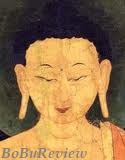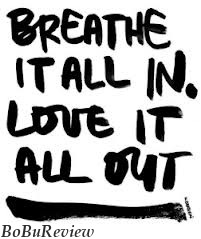The power of spiritual transformation: "Just because it's real doesn't mean it's true"
 Rinpoche's sub-title -- full disclosure here, he's my main teacher
-- is Awakening the Power of Essence Love. Rinpoche's sub-title -- full disclosure here, he's my main teacher
-- is Awakening the Power of Essence Love.
We are under pressure, in these perilous and precious times, to turn from carbon-based life forms
into carbon's highest form: diamonds of life forms. Tsoknyi Rinpoche's first "mainstream" book, chock-full
of his wonderful personal anecdotes and teaching stories, as well as numerous insights about how to apply the dharma to our
everyday dilemmas, can help significantly in our individual and collective transformation. Of course I'm prejudiced,
but I think anyone interested in their spiritual path would benefit from this book.
Buddhism is very good at showing us how to transform obstacles into
opportunities -- for clarity, illumination, and spiritual realization. I've always loved the way the five poisons
-- greed, anger, jealousy, pride, and ignorance -- are, in their deepest and most profound essences, distorted versions
of the five wisdoms. Before transformation can take place, however, as Rinpoche points out, we need to take care of
our "wounded love," or a kind of very conditional love. This is a problem for which Buddhism has many antidotes.
One
of the first is the practice of tonglen, or "sending and taking,"  and which involves a combination of breathing and visualization to send out
whatever positive energy you have to those in need. It's good to do "when we're feeling bad about ourselves --
when we're consumed by anger, despair, jealousy, or some other negative feeling. We take these feelings, and our desire
to get past them, as a starting point . . . Tonglen is not a practice of forgiving or forgetting. Rather, it is a practice
that provides us with the capability of rising beyond the personal pain that we have endured and restoring confidence in our
ability to face challenges; that we can move beyond it and learn to live productive, fulfilling lives." and which involves a combination of breathing and visualization to send out
whatever positive energy you have to those in need. It's good to do "when we're feeling bad about ourselves --
when we're consumed by anger, despair, jealousy, or some other negative feeling. We take these feelings, and our desire
to get past them, as a starting point . . . Tonglen is not a practice of forgiving or forgetting. Rather, it is a practice
that provides us with the capability of rising beyond the personal pain that we have endured and restoring confidence in our
ability to face challenges; that we can move beyond it and learn to live productive, fulfilling lives."
One of the most original chapters in the book is called "Mis'I'dentification." Rinpoche identifies four levels of "I," beginning with the "mere I," which would be comparable
to a rather undifferentiated ego stage, as in childhood. However, as we "shift out of the fluid movie experience
in which we've been immersed ... we start seeking some sort of stability . . . something readily definable or dependable,
a place where we can rest." This is where things get tricky. Rather than retain a fluid sense of ourselves,
we tend to solidify our perceptions of ourselves as well as others, rather like water turning into ice. At this stage,
we've turned into a "solid I:" "In the beginning, the 'solid I' is pretty much identified with our bodies.
But as we mature, this 'solid I' becomes more abstract or conceptual."
And thus we start to become disconnected from ourselves.
"Our attempts to identify with and as a 'solid I' provide the foundation for the third layer of identification, which,
in many ways, prohibits us from realizing our potential . . . Our 'I' becomes 'precious' [can't help thinking about Golem
in The Lord of the Rings] or 'cherished' in the sense that it becomes the main channel through which all our thoughts, feelings,
and actions are directed." In other words, we think of ourselves first and foremost and our sense of separateness
from others increases.
"Unlike the other layers of self, the [next level of ego] 'social I' is
not part of the traditional Buddhist model of 'I' or ego layers. My understanding is grounded in my own experience as
well as in conversations with Western psychologists, and it's taken me a number of years to identify and describe it."
Rinpoche explains that the "social I" is one of the ways "we look for fulfillment or confirmation . . . We
look to other people for confirmation of who [we] are, who we would like to be, or what we believe about ourselves."
This is where we can get hung up on our appearances, careers, status, or wealth.
We are cautioned not to
throw the baby out with the bath water: "A lot of people think that Buddhism promotes the idea of extinguishing
the idea of 'I' or 'self' or 'ego' altogether. But the idea of extinguishing 'ego' or 'self' or 'I' is inaccurate.
You may as well try to 'extinguish' your feet or your hands." (I am sooo grateful to Rinpoche for this clarification,
because I think the misperceptions about ego have led to a lot of spiritual bypassing in Western practitioners.) "The
challenge the Buddha proposed was to learn to rest in openness of the 'mere I' even while using the various other 'I's'; to
maintain a sense of warmth and openness even when, for instance, facing someone who disagrees with you."
|
|
One of Rinpoche's main teachers, Adeu Rinpoche, who spent two decades
in a Chinese prison camp, told him, "Always remember that the main goal of any practice is to awaken the heart."
Rinpoche calls this work "awakening the power of essence love." It seems clear to me that if we are to survive
these challenging times -- and even thrive -- we must begin to bust through our reified selves and reach out to others more
than we ever have
|
However, as Rinpoche
reminds us, in order to transform the world, we must start with ourselves first. Spiritual
transformation begins at home. Paki S. Wright, Editor June, 2012
|

